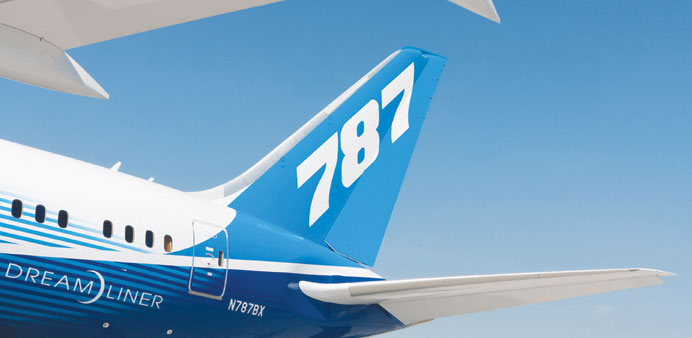The region’s financial institutions in 2013 continue to surpass expectations for new delivery financing of Boeing commercial airplanes
The Middle East region is expected to require some 2,610 jetliners valued at $550bn, Boeing said in its latest 20-year outlook for commercial aviation.
Globally, Boeing forecasts a $4.8tn market for jet transport over the next 20 years.
The Middle East’s financial institutions in 2013 continue to surpass expectations for new delivery financing of Boeing commercial airplanes, the aircraft maker reported at its annual financiers and investors’ conference for the Middle East, Africa and South Asia region in Dubai.
The positive trend comes as global jet makers expect record deliveries in 2013, with Middle East support for US-built jetliners doubling between 2011 and 2012 to approximately $6.4bn.
“From the time historically when Middle East institutions funded about one-fifth of the region’s deliveries with their own capital, this year we expect to have two-thirds of Boeing deliveries here covered, which is a 7% increase over 2012’s explosive growth,” said Rich Hammond, a senior director of Boeing Capital Corp, the manufacturer’s financing and leasing unit and an event co-host.
Boeing told the audience of some 150 commercial bankers and investment officials that the region’s increased investor interest in aircraft is helping offset adjustments from other primary funding sources. These include limits on bank lending from new global regulations taking effect and higher fees for jetliner export credit agency financing that occurred globally in 2013.
“In today’s more globally diversified pool of commercial banks, the Middle East is rivaling support for our products from the likes of other economic powers,” Hammond said.
Aircraft financing is seeing a major surge in support from the capital markets, where airline bond issuances, backed by new and used aircraft assets, are many times oversubscribed and pricing at record-low rates.
While previously limited primarily to US carriers due to strong lender protections in place there, aircraft bond deals have completed successfully in Canada, Europe and the Middle East, and more are expected.
“There’s keen interest by Middle East banks to work with the capital markets to help originate and syndicate regional aircraft financing opportunities, and Boeing’s working together with financial institutions here on structures that will facilitate such opportunities,” said Kostya Zolotusky, Boeing Capital managing director for capital markets development and leasing.
As an example, Boeing will host the region’s first-ever capital markets summit, in Dubai, next month.
“Boeing’s relationships in the region run long and deep, and it’s exciting that mutual interest in aircraft financing is providing us many new partnering opportunities as we to bring together the relevant participants,” said Jeffrey Johnson, president of Boeing Middle East, who will co-host the markets summit.Boeing sees increased investor appetite for expanding deliveries outside of the Middle East region.
Boeing’s relationship with the Middle East extends back to 1945. Since then, Boeing has established numerous regional offices, first in Riyadh in 1982, then a dedicated Boeing Defence, Space & Security office in Abu Dhabi in 1999, a regional headquarters in Dubai in 2005 and a new office in Doha in 2010.
The tailfin of a Boeing 787 Dreamliner is seen on display at the Dubai Air Show (file). Boeing has said the Middle East’s increased investor interest in aircraft is helping offset adjustments from other primary funding sources.

